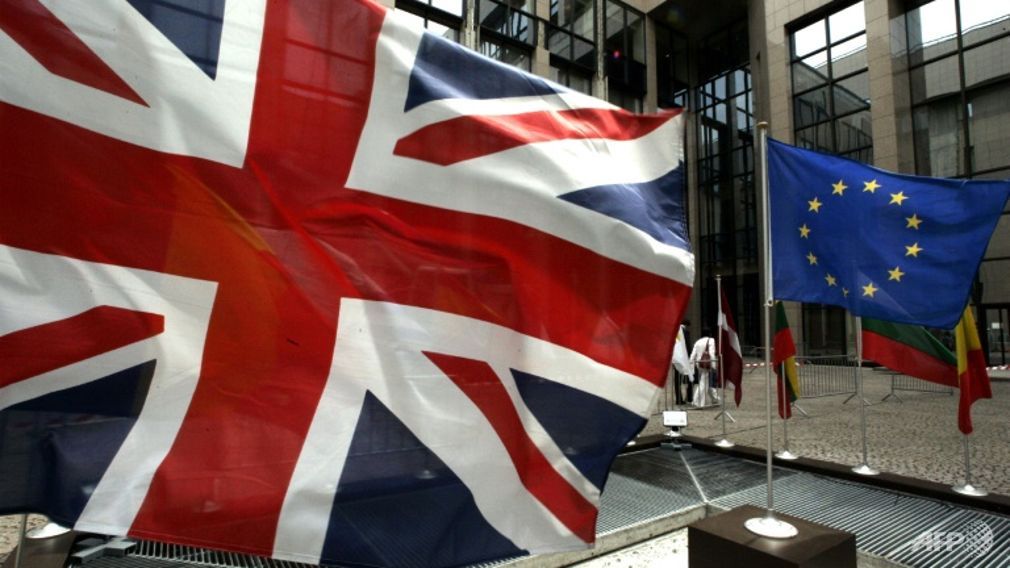Brexit’s impact on financial markets ‘not a major concern’: DPM Tharman
 |
| In a nationwide referendum held on June 23, Britain voted to leave the European Union by a 52 per cent to 48 per cent margin. (AFP/Gerard Cerles) |
“The short term of Brexit is mainly on the financial markets, more than on economies. The immediate impact of Brexit on stock markets and currencies has also not been a major concern for us,” said Mr Tharman, referring to the gyrations in financial markets following Britain’s vote to exit the EU in a referendum held on Jun 23.
In particular, the pound sterling crashed to its lowest level in more than 30 years on the back of growing anxiety that a British pull-out from the bloc would mean severe repercussions for the UK’s economy.
Safe haven currencies such as the Japanese yen appreciated strongly, while the Singapore dollar weakened against the US dollar alongside other Asian currencies, in a move that Mr Tharman described as “typical in the case of a sudden increase in (the) risk in global markets”. The movement of the Singapore dollar nominal effective exchange rate (S$NEER) has also been “orderly and contained”, he added.
Moving forward, global financial markets will likely witness "repeated bouts of volatility".
BREXIT'S LONG-TERM IMPACT HARD TO TELL: DPM THARMAN
The impact of Brexit in the longer run is harder to ascertain given the unprecedented referendum result, Mr Tharman said. One issue that will be of greater concern is the political and economic uncertainties that will likely weigh on the UK, Europe and global economy for “at least a few years”.
“There's no clarity within the UK on the nature of its future relations with the EU. This state of affairs may persist for some time, and it’s not clear when the UK will formally trigger Article 50 which serves formal notice to leave the EU. Even after the formal notice is served, negotiations between UK and EU will be complex and prolonged,” Mr Tharman said.
“Until the future trade and investment relations with the EU is settled, the uncertainty is likely to reduce investments and economic growth in the UK, and to some extent in the Europe as well, and that will present another headwind in subdued global economic outlook,” he added.
For the near term, the Ministry of Trade and Industry (MTI) does not expect Brexit to result in a “significant reduction” in Singapore’s growth. Mr Tharman cautioned, however, that there could be a major impact on Singapore’s economy if the events in Europe coincide with other events such as a sharp slowdown in growth in China and the US.
In addition, should Brexit spark a shift toward a protectionist stance in global trade policies, there could repercussions on Singapore, Mr Tharman added, citing a World Bank report which said that a British pull-out from the bloc has “marked a historic shift in trade policy attitudes”.
“It is premature to (talk about) the long-term impact of Brexit. We must watch the developments carefully and prepare to adjust our strategy so that we stay competitive as an economy and retain good jobs in Singapore.”
GIC, TEMASEK HAVE "WELL-DIVERSIFIED PORTFOLIOS”: DPM
In response to a question from MP Patrick Tay on how Brexit and the accompanying market volatility could impact the investments of Singapore's sovereign wealth fund GIC and Temasek Holdings, Mr Tharman said that remains too early to tell.
“GIC and Temasek, like other global investors, can never be insulated from volatility in financial markets," he added: "However, both GIC and Temasek make investment decision for the long-term (and they) look beyond short-term boom and bust. Their focus with regards to Brexit is to assess how it would fundamentally alter the long-term prospects for the EU and UK economies.”
Mr Tharman raised the example of how GIC and Temasek's investment portfolios declined significantly alongside the market downturns during the 2008 global financial crisis. However, both managed to recover their value "within one to two years and continued to grow since then," he said.
He also described the portfolios of both GIC and Temasek as "well-diversified", citing the latter's equity portfolio as being well-spread across industries and sectors. "So at any one point in time (when) you’re hit by one cycle or another, it’s the overall portfolio over the long term that determines whether you’re delivering good long-term value."
What the stars mean:
★ Poor ★ ★ Promising ★★★ Good ★★★★ Very good ★★★★★ Exceptional
Latest News
More News
- 72 nations sign landmark Hanoi cybercrime convention (October 26, 2025 | 18:00)
- UN Secretary-General commends Vietnam’s global leadership (October 26, 2025 | 09:00)
- APEC finance ministers convene to tackle regional challenges (October 22, 2025 | 17:31)
- Rewiring global trade: ASEAN’s rise as supply chain hub (October 17, 2025 | 11:40)
- Vietnam attends first World Nuclear Week Forum in Russia (September 26, 2025 | 10:50)
- Vietnam attends 69th session of IAEA General Conference (September 16, 2025 | 10:00)
- ADB, WB pledge over 12 billion USD for ASEAN power grid, renewable energy projects (August 15, 2025 | 14:18)
- Lowy Institute proposes AI-based tobacco control solutions for ASEAN (August 15, 2025 | 14:14)
- Cloud computing policy to position Malaysia as regional hub by 2030 (August 15, 2025 | 14:11)
- Thailand, Cambodia suffer numerous cyber attacks (August 05, 2025 | 16:19)


















 Mobile Version
Mobile Version